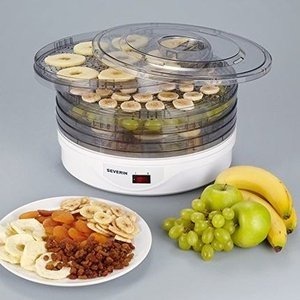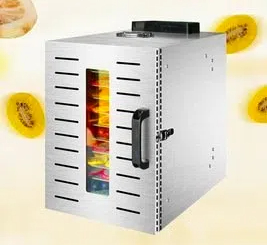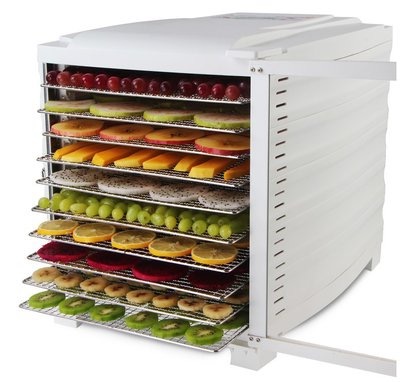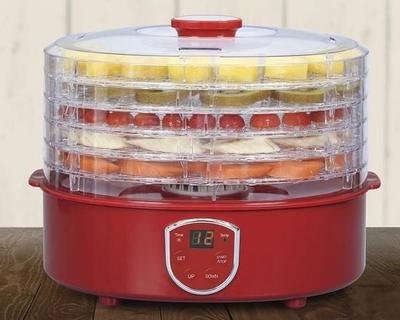
Content Menu
● Introduction to Fruit Drying Technology
● Understanding the Basics of Fruit Drying
● Types of Fruit Drying Machines
>> 1. Commercial Fruit Dehydrators
>> 2. Industrial Food Dryers
>> 3. Heat Pump Fruit Drying Machines
● Key Features of Modern Fruit Drying Machines
>> 1. Multi-Layer Design
>> 2. Stainless Steel Construction
>> 3. Energy-Efficient Operation
>> 4. Automatic Fruit Dehydration Systems
>> 5. Large Capacity
● The Importance of Temperature Control in Fruit Drying
● Applications of Fruit Drying Machines
>> 1. Commercial Food Production
>> 2. Agricultural Operations
>> 3. Specialty Food Businesses
>> 4. Research and Development
● Benefits of Using Fruit Drying Machines
>> 1. Extended Shelf Life
>> 2. Preservation of Nutritional Value
>> 3. Space-Efficient Storage
>> 4. Year-Round Availability
>> 5. Value Addition
● Choosing the Right Fruit Drying Machine
● Maintenance and Care of Fruit Drying Machines
● Future Trends in Fruit Drying Technology
● Conclusion
● Frequently Asked Questions
>> 1. What is the optimal temperature for drying most fruits?
>> 2. How long does it typically take to dry fruits in a commercial fruit dehydrator?
>> 3. Are there any fruits that cannot be dried using a fruit drying machine?
>> 4. How do heat pump fruit drying machines differ from conventional dryers?
>> 5. What are the key factors to consider when scaling up from a small-scale to an industrial fruit drying operation?
Introduction to Fruit Drying Technology
In recent years, the food preservation industry has witnessed a significant transformation with the advent of advanced fruit drying machines. These innovative devices have revolutionized the way we preserve fruits, vegetables, and other food items, offering numerous benefits to both commercial enterprises and home users. This comprehensive guide will delve into the world of fruit drying machines, exploring their features, benefits, and applications in various settings.
Understanding the Basics of Fruit Drying
Fruit drying is an age-old preservation technique that has been practiced for centuries. The process involves removing moisture from fruits to inhibit the growth of bacteria, yeast, and mold, thereby extending their shelf life. Traditional methods of sun drying or air drying have been used for generations, but they come with limitations such as weather dependence and potential contamination.
Modern fruit drying machines have addressed these challenges by providing a controlled environment for dehydration. These devices use various technologies to efficiently remove moisture while preserving the nutritional value, flavor, and appearance of the fruits.
Types of Fruit Drying Machines
1. Commercial Fruit Dehydrators
Commercial fruit dehydrators are designed for large-scale operations in food processing industries. These machines can handle substantial quantities of fruits and often feature multiple trays or conveyor belts to maximize drying capacity. They are equipped with advanced temperature and humidity control systems to ensure consistent and high-quality results.
2. Industrial Food Dryers
Industrial food dryers are versatile machines capable of drying not only fruits but also vegetables, herbs, and other food products. These heavy-duty units are built to withstand continuous operation and often incorporate energy-efficient technologies to reduce operational costs.
3. Heat Pump Fruit Drying Machines
Heat pump fruit drying machines represent the cutting edge of dehydration technology. These systems use a heat pump to recirculate hot air, resulting in improved energy efficiency and precise temperature control. Heat pump dryers are particularly effective for preserving delicate fruits that require gentle drying conditions.

Key Features of Modern Fruit Drying Machines
1. Multi-Layer Design
Many fruit drying machines feature a multi-layer or multi-tray design, allowing for the simultaneous drying of different types of fruits or large quantities of the same fruit. This design maximizes space efficiency and increases overall drying capacity.
2. Stainless Steel Construction
High-quality fruit dryers often utilize stainless steel components, particularly for trays and internal structures. Stainless steel is durable, easy to clean, and resistant to corrosion, making it ideal for food processing applications.
3. Energy-Efficient Operation
Modern fruit drying equipment is designed with energy efficiency in mind. Features such as insulated chambers, heat recovery systems, and programmable controls help minimize energy consumption without compromising drying performance.
4. Automatic Fruit Dehydration Systems
Advanced fruit dryers incorporate automation features that simplify the drying process. These may include automatic shut-off timers, preset drying programs for different fruits, and sensors that monitor and adjust drying conditions in real-time.
5. Large Capacity
Commercial and industrial fruit dryers are built to handle large volumes of produce. Some models can accommodate hundreds of pounds of fruits in a single batch, making them suitable for commercial orchards, food processing plants, and large-scale preservation operations.
The Importance of Temperature Control in Fruit Drying
One of the most critical aspects of effective fruit drying is precise temperature control. Different fruits require specific temperature ranges for optimal drying, and maintaining consistent temperatures throughout the drying process is essential for preserving quality and nutritional value.Temperature-controlled food dehydrators offer the following advantages:
1. Preservation of nutrients and enzymes
2. Retention of natural flavors and aromas
3. Prevention of case hardening (when the outer layer dries too quickly, trapping moisture inside)
4. Consistent drying results across different batches
Professional fruit drying technology often incorporates multiple temperature sensors and sophisticated control systems to maintain ideal drying conditions throughout the entire process.

Applications of Fruit Drying Machines
1. Commercial Food Production
Fruit drying machines play a crucial role in the commercial food production industry. They are used to create dried fruit snacks, ingredients for cereals and baked goods, and fruit powders for various applications. The ability to process large quantities of fruits quickly and efficiently makes these machines indispensable for food manufacturers.
2. Agricultural Operations
Orchards and fruit farms use industrial fruit dehydrators to preserve excess harvest and create value-added products. By converting fresh fruits into dried form, farmers can extend the selling season and reach new markets with shelf-stable products.
3. Specialty Food Businesses
Artisanal food producers and specialty stores often utilize fruit drying machines to create unique dried fruit products. These may include exotic fruit blends, organic dried fruits, or custom-flavored dried fruit snacks.
4. Research and Development
Food scientists and product developers use fruit drying equipment to experiment with new drying techniques, develop innovative dried fruit products, and optimize preservation methods for different fruit varieties.
Benefits of Using Fruit Drying Machines
1. Extended Shelf Life
By removing moisture from fruits, drying machines significantly extend their shelf life. Properly dried fruits can be stored for months or even years without refrigeration, reducing food waste and allowing for long-term storage.
2. Preservation of Nutritional Value
Modern fruit drying techniques help retain a significant portion of the fruits' original nutritional content. Unlike some other preservation methods, drying does not require the addition of preservatives or chemicals, resulting in a more natural and healthier product.
3. Space-Efficient Storage
Dried fruits occupy much less space than their fresh counterparts, making them easier to store and transport. This is particularly advantageous for businesses dealing with large quantities of fruits or those with limited storage facilities.
4. Year-Round Availability
Fruit drying machines enable the preservation of seasonal fruits, making them available throughout the year. This allows consumers to enjoy their favorite fruits regardless of the season and provides a steady supply for food manufacturers.
5. Value Addition
By transforming fresh fruits into dried products, businesses can add value to their offerings. Dried fruits often command higher prices than fresh fruits and can be marketed as premium or specialty products.
Choosing the Right Fruit Drying Machine
Selecting the appropriate fruit drying machine depends on several factors:
1. Production volume: Consider the quantity of fruits you need to process regularly.
2. Types of fruits: Different fruits may require specific drying conditions.
3. Energy efficiency: Look for models with energy-saving features to reduce operational costs.
4. Automation level: Determine how much manual intervention you're willing to accept in the drying process.
5. Budget: Balance the initial investment with long-term benefits and operational costs.
6. Space constraints: Ensure the machine fits within your available space.
7. Maintenance requirements: Consider the ease of cleaning and ongoing maintenance needs.
Maintenance and Care of Fruit Drying Machines
Proper maintenance is crucial for ensuring the longevity and optimal performance of fruit drying machines. Some key maintenance practices include:
1. Regular cleaning of trays and internal components
2. Inspection and replacement of filters and heating elements as needed
3. Calibration of temperature and humidity sensors
4. Lubrication of moving parts in accordance with manufacturer guidelines
5. Periodic professional servicing to address any potential issues
Future Trends in Fruit Drying Technology
The fruit drying industry continues to evolve, with several exciting trends on the horizon:
1. Integration of IoT (Internet of Things) technology for remote monitoring and control
2. Development of hybrid drying systems combining multiple drying technologies
3. Increased focus on sustainable and eco-friendly drying solutions
4. Advancements in packaging technology to further extend the shelf life of dried fruits
5. Exploration of novel drying techniques to preserve more sensitive nutrients and flavors
Conclusion
Fruit drying machines have transformed the landscape of food preservation, offering efficient, reliable, and high-quality solutions for both commercial and home use. As technology continues to advance, we can expect even more innovative features and improved performance from these essential devices. Whether you're a large-scale food producer, a small specialty business, or a home enthusiast, investing in a quality fruit drying machine can open up a world of possibilities in fruit preservation and product development.

Frequently Asked Questions
1. What is the optimal temperature for drying most fruits?
Answer: The optimal drying temperature for most fruits ranges between 125°F to 140°F (52°C to 60°C). However, this can vary depending on the specific fruit and desired end result. Some delicate fruits may require lower temperatures, while others can withstand higher heat.
2. How long does it typically take to dry fruits in a commercial fruit dehydrator?
Answer: Drying times can vary significantly depending on the fruit type, its water content, and the specific drying conditions. On average, it can take anywhere from 6 to 36 hours to fully dry fruits in a commercial dehydrator. Berries and thin-sliced fruits may dry faster, while dense or high-moisture fruits like apples or pears may take longer.
3. Are there any fruits that cannot be dried using a fruit drying machine?
Answer: While most fruits can be dried, some are not ideal candidates due to their high fat or water content. Avocados, for example, are not typically dried due to their high fat content. Very juicy fruits like watermelon can be challenging to dry effectively. However, with the right techniques and equipment, even these fruits can be processed, though the results may differ from traditional dried fruits.
4. How do heat pump fruit drying machines differ from conventional dryers?
Answer: Heat pump fruit drying machines use a closed-loop system that recirculates and dehumidifies the air, making them more energy-efficient than conventional dryers. They operate at lower temperatures, which can better preserve the nutritional content and color of fruits. Heat pump dryers also provide more precise temperature and humidity control, resulting in more consistent drying results.
5. What are the key factors to consider when scaling up from a small-scale to an industrial fruit drying operation?
Answer: When scaling up to an industrial fruit drying operation, consider the following factors:
- Increased capacity requirements and equipment size
- Energy efficiency and operational costs
- Automation capabilities to reduce labor needs
- Quality control measures for consistent results
- Compliance with food safety regulations
- Storage and packaging solutions for larger volumes
- Supply chain management for raw materials and finished products
- Potential for product diversification and market expansion
These considerations will help ensure a smooth transition to larger-scale fruit drying operations while maintaining product quality and operational efficiency.












